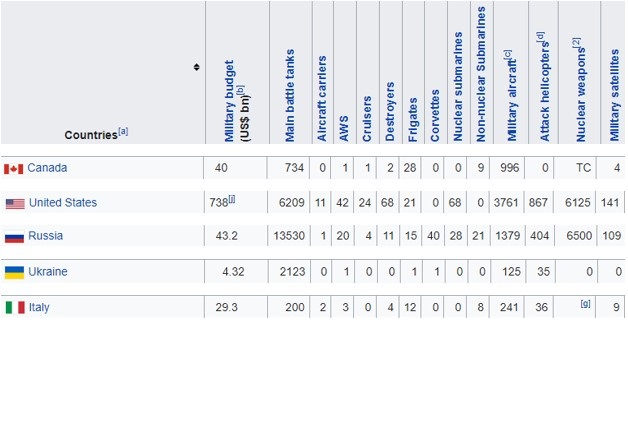Militarily Canada has really little to offer
TORONTO – Ukraine’s President Zelensky came to Ottawa’s House of Commons with a clear message: moral support is appreciated; humanitarian aid is welcome but lethal aid is necessary for our survival. What does that last option mean? How practical a position is it to embrace? Could we even deliver if we were so disposed and do it in a timely manner?
Practicality would suggest a pessimistic response. “Friendship” is not part of the language of international diplomacy. “Interests” and “legal obligations” are. In any case, the over-riding presence of the American behemoth make every military consideration irrelevant without their buy-in (Wikimedia Commons, Military Equipment by Country, 2020).
To begin, in terms of military spending, Canada has little to offer in materiel for its $40 Billion (USD) annual budgets. It does have 734 battle tanks, if we could get them to the theatre of war. Russia for its $43.2 already has 13,530 such tanks.
Ukraine’s 2,123 tanks will not be easily replaceable given its $4.32 Billion budget – only 10% the size available to Russia.
The USA, which allocates $738 Billion annually obviously has an incomparable replacement and production capacity to feed its 6,209 battle tanks available.
With its prodigious navy, it also has the capacity to deliver them; we do not.
It appears the only lethal aid we can provide is in military aircraft. Our total of 996 compares favourably with Ukraine’s 125 and might have the capacity to level the imbalance when facing Russia’s 1,379.
Again, the USA’s 3,761 would be of great impact. As a partner in NATO, their partnership is invaluable.
They would have to agree that any lethal aid would not trigger a war that might provoke another leading to a conflagration of mutual destruction – a nuclear war.
In such a conflict, the two biggest players by far are the USA with 6,125 nuclear weapons and Russia with 6,500. They both have the precision delivery systems to hit targets thousands of kilometers away.
This fact alone should have a calming/cooling effect on the emotional rhetoric based on eliciting glorification or vilification of either side. As displeasing as the unrequited emotional reaction against aggression might be, the practical issue is that if we are to enjoin a war, everyone must prepare for it. As things stand, we are hardly prepared to provide humanitarian aid.
It is a good sign that both sides appear to have offered a glimmer of hope that talks of a “peaceful” settlement may be close.




